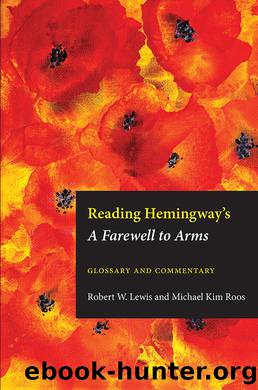Reading Hemingway's Farewell to Arms by Roos Michael Kim;Lewis Robert W.; & Michael Kim Roos

Author:Roos, Michael Kim;Lewis, Robert W.; & Michael Kim Roos
Language: eng
Format: epub
Publisher: The Kent State University Press
In any case, this quote, taken from Shakespeareâs Henry IV Part 2, Act III, Scene ii, closely pertains to Frederic and Catherineâs story, and in being the words not of a Caesar but of a common soldier, a recruit of Henry IV, wonderfully named Feeble, it reveals Hemingwayâs view that the nature of war may be both philosophically and simplistically perceived. White hunter Robert Wilson uses Feebleâs lines in Hemingwayâs short story âThe Short Happy Life of Francis Maccomberâ (CSS 25). Mark Cirino has an extended discussion of this reference in Thought in Action (chap. 7n16).
Hemingway also alludes to Feebleâs lines in Across the River and into the Trees, where Richard Cantwell and the Gran Maestro at the Gritti Palace Hotel remember âthe men who decided that they did not wish to die; not thinking that he that dies on Thursday does not have to die on Fridayâ (59). See Cirinoâs commentary on this passage in Reading Hemingwayâs Across the River and into the Trees (63â64).
122:5 âI donât know ⦠inside the head of the braveâ: Catherineâs assertion forces Frederic to back down and admit that they are speaking of something that is very subjectiveâinside the headâwhich can never be verified.
122:12â13 âIâm like a ball-player that bats two hundred and thirty and knows heâs no betterâ: Frederic is confident in this bit of self-knowledge, subjective as it is. He knows (possesses a justified belief) that he is not brave. Sport again illustrates his self-knowledge: a baseball player with a .230 batting average is not very good, mediocre at best. It means that, not counting bases on balls, the hitter reaches base safely no more than 23 percent of the time. Good hitters should reach base at least 30 percent of the time. Note that Frederic uses an objective statistic to quantify his subjective awareness of his lack of bravery.
122:14â17 âItâs awfully impressive.â ⦠âBut still a hitterâ: Being British, Catherine does not know baseball and its esoteric statistics. However, she knows enough to understand correctly that the major leagues must have many âmediocreâ hitters. Frederic may be correct that he will never be a Babe Ruth or a Hall of Famer, but he can still be in the game. The duel between knowing and not knowing is settled, at least for the time being, with that comic truce followed by lighthearted banter to close out a troubling chapter on a lighter note.
122:32â33 âFor three years ⦠the war ending at Christmasâ: There are two important points to make about this line. First, Catherine acknowledges how her view of the war has grown much more realistic than her âchildishâ fantasies that it would end at Christmas. She has matured into an adult, in other words. The second point is that she associates this childish fantasy with Christmas, one of the most important religious holidays, if not the most important, of the year. For her, at least, the implication is that religious belief is a childish fantasy.
122:34â35 âour son will be a
Download
This site does not store any files on its server. We only index and link to content provided by other sites. Please contact the content providers to delete copyright contents if any and email us, we'll remove relevant links or contents immediately.
The Power of Myth by Joseph Campbell & Bill Moyers(936)
Half Moon Bay by Jonathan Kellerman & Jesse Kellerman(920)
A Social History of the Media by Peter Burke & Peter Burke(886)
Inseparable by Emma Donoghue(853)
The Nets of Modernism: Henry James, Virginia Woolf, James Joyce, and Sigmund Freud by Maud Ellmann(772)
The Spike by Mark Humphries;(730)
A Theory of Narrative Drawing by Simon Grennan(712)
The Complete Correspondence 1928-1940 by Theodor W. Adorno & Walter Benjamin(711)
Ideology by Eagleton Terry;(665)
Bodies from the Library 3 by Tony Medawar(656)
World Philology by(649)
Culture by Terry Eagleton(648)
Farnsworth's Classical English Rhetoric by Ward Farnsworth(647)
Adam Smith by Jonathan Conlin(618)
A Reader’s Companion to J. D. Salinger’s The Catcher in the Rye by Peter Beidler(616)
Game of Thrones and Philosophy by William Irwin(604)
High Albania by M. Edith Durham(598)
Comic Genius: Portraits of Funny People by(588)
Monkey King by Wu Cheng'en(581)
